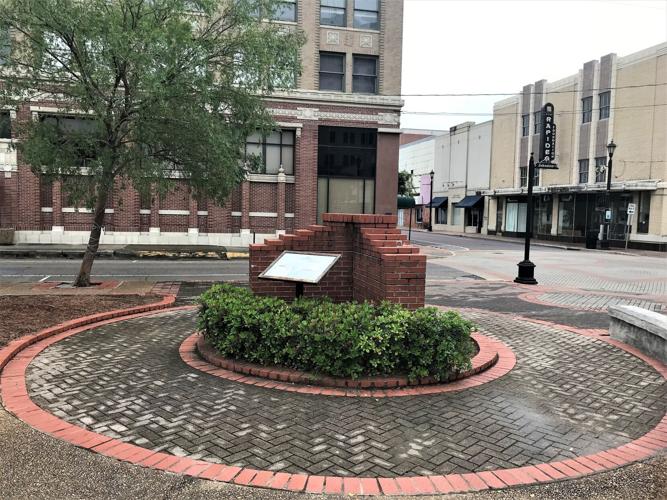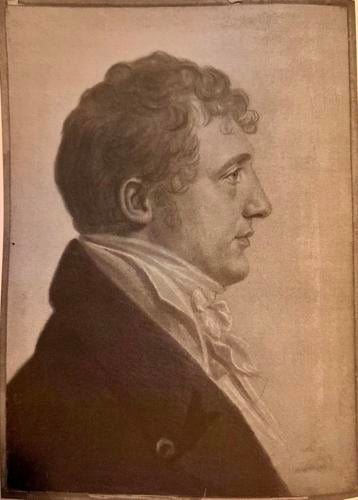
A marker commemorating the City of Alexandria's founding father, Alexander Fulton, can be found a park bearing his name across from City Hall in the city's downtown area.
Good guy or bad?
The thought came to Alexandria resident and novelist Bill Sumrall while reading about Alexander Fulton.
Fulton may not be a household name around the state, but he's well-known in and around Alexandria as the city's founding father. Historical markers, street signs and a downtown park bear his name. He was even the namesake for a drawbridge that once connected Alexandria to Pineville.
"But what's the real story behind Alexander Fulton?" Sumrall asked Curious Louisiana.
Well, that depends on which historical account you're reading.
While Alexandria's historical markers and past written histories present Fulton as a benevolent benefactor of sorts, a recent book on the city's founder, "For The Admiration of Men and Angels … The Life and Crimes of Alexander Fulton," shows him in a different light.

An engraving believed to be an image of Alexander Fulton loaned to Michael Wynne for his book, 'For The Admiration of Men and Angels ... The Life and Crimes of Alexander Fulton.'
Book tells different story
The book was written and released in October by historian Michael D. Wynne, who says it has caused quite a local stir.
Wynne asked the same question posed by Sumrall, which led him down a thoroughly researched path of scandal and corruption. His search included public and private archives, newspapers, libraries and the Library of Congress.
From the start, Wynne discovered that Fulton's real past was, in short, sketchy.
"Alexander Fulton, in one of my key statements in the book, is the only man in American history who was going to be executed twice for treason and was pardoned both times by George Washington," Wynne said.
The first death sentence was handed down in March 1777, when Fulton was working as a steward for Washington. Fulton and another worker, William Stone, were accused of trading inside information to the British during the Revolutionary War.
"Stone was executed, but George Washington wrote a letter pardoning Fulton," Wynne said. "In the letter, he said Fulton was young and to chew him out and release him with a warning. That was in April of 1777."

A marker commemorating the City of Alexandria's founding father, Alexander Fulton, can be found a park bearing his name across from City Hall in the city's downtown area.
Fulton comes to Louisiana
In 1796, Fulton then travels from Pennsylvania to Louisiana.
"He didn't come here to homestead or be a pioneer," Wynne said. "He was on the run from being put to death for treason during the Whiskey Rebellion, and Louisiana was Spanish territory when he arrived."
That's the summary of this story, which begins with Fulton's general biography. Wynne writes that previous historical accounts pinpoint Fulton's birthplace as Pennsylvania, but Wynne discovered the founder was born in Scotland between 1762 and 1763. Information on how he came to the United States is nonexistent.
His chosen profession?
"He was a distiller," Wynne said, which accounts for his leadership in the Whiskey Rebellion, a violent protest against a federal tax on whiskey in 1794.
The fight started with farmers attacking federal revenue officers tasked with collecting the tax and peaked in July 1794, when some 500 men attacked and burned the home of the local tax inspector.
Washington was president at the time. He sent in 13,000 militia troops to quell the rebellion, collapsing it without any confrontations.

The signature of Alexander Fulton, founder of Alexandria.
That's when Fulton fled to the Spanish Territory of Louisiana. A general death sentence was issued to all involved, which eventually was rescinded by Washington, meaning Fulton's name was cleared.
Irish or Scottish?
Speaking of the Fulton name, there's even some sketchy history surrounding that.
"All the books that talk about Fulton say he was Irish, but he was Scottish," Wynne said. "I found his baptismal record, and he was an only child. His mother died in childbirth, and he later lived in the Strabane township of Washington County, Pennsylvania, where he paid taxes for at least a year."
Fulton and his business partner, William Miller, initially came to Louisiana as fugitives, where, Wynne discovered, they began selling hops for alcohol production.
"They took on a third partner, William Bradford, who would build The Myrtles Plantation in St. Francisville," Wynne said. "And they said they would supply goods to the Spanish government for a reasonable price, but they wanted an exclusive agreement to deal with the Indians."

A photo of Alexander Fulton's business partner, William Miller, loaned to Michael Wynne by G.P. Whittington History for his book, 'For The Admiration of Men and Angels ... The Life and Crimes of Alexander Fulton.'
Cheated Native Americans
Their deal with the Native Americans was a scam.
"They had a trading post, and they would work out deals, telling the Indians they could take anything in the trading post and pay later by just signing the ledger book," Wynne said. "And finally, one day in 1800, Miller and Fulton, after only two years, said, 'OK it's time to pay up.' The Indians had nothing to give, but Fulton and Miller said, 'Yeah, you do — you have 50,000 acres of land.'"
Fulton and Miller forged legal documents requiring the Native Americans to sign over their property. Those documents eventually ended up in a court case, where Fulton paid off the Indian agent advocating for the tribes to destroy written testimonies in exchange for 7% of the land.
"Eventually, Fulton lost a good bit of land," Wynne said. "Basically, he owned everything in Alexandria, but it was all swampland, and it flooded."
Meanwhile, Pineville was booming on the other side of the river and was poised to become the parish seat.

A photo of a street sign named for Alexandria founder Alexander Fulton in downtown Alexandria.
"There was nothing on that land that would become Alexandria, it was just this flooded land," Wynne said. "Nobody wanted to build anything there or try growing crops. But Fulton used his political influence, once Louisiana got purchased in 1803 by the United States, to make deals with the American government. He was really buttering up Louisiana's first territorial governor, William C.C. Claiborne, to make Alexandria the parish seat."
Fulton was the area's wealthiest resident at the time, and despite his shady dealings, its most prominent.
"So, if the most prominent and richest man, wants the parish seat in Alexandria, it must be good, right?" Wynne said. "So, all his land became the parish seat."
Averted Aaron Burr's plot
Now, that's not saying Fulton was all bad. He made a small contribution to the prevention of Aaron Burr's plot overtake the U.S.
"He hosted Gov. Claiborne and Gen. James Wilkinson, the commander-in-chief of the U.S. Army in New Orleans, at his house in Alexandria," Wynne said. "It was called Brickyard Plantation, and it was there in 1806 that they discussed plans to stop Aaron Burr's plan to overturn the United States."
For fans of the musical, "Hamilton," this was the same Burr who fatally shot Alexander Hamilton in a duel.
"Fulton was also elected the first territorial legislator of what would become Rapides Parish, and he would become the first postmaster of what would become Alexandria in 1807," Wynne said. "And he appears to have been a loving husband and father by surviving accounts."
If he hadn't been a loving father, would he have named the city of Alexandria in memory of his son, Alexander Fulton Jr., who died in 1800?






